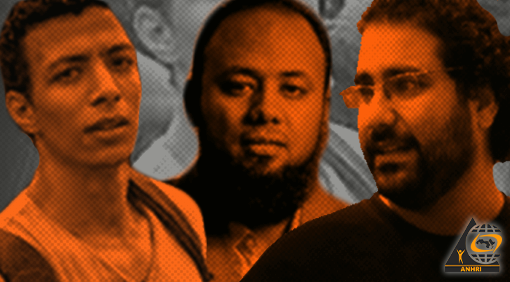
Cairo: 17 October 2021
The Arabic Network for Human Rights Information (ANHRI) announced its vehement rejection of referring prisoner of conscience and vlogger “Mohamed Oxygen” to trial before an exceptional court “State Security Emergency, tomorrow (Monday 18 October), after exceeding the two-year legal limit of pretrial detention, adding that instead of releasing him in compliance with the rule of the Constitution and the law, “Oxygen” has been referred to an exceptional trial that lacks the minimum standards of fair trial.
ANHRI said: “This trial comes as a continuation of the deliberate crackdown against Mohamed Oxygen, who barely escaped death, three months ago, after attempting suicide inside his prison cell in Tora High Security Prison 2, trying to escape the cruel treatment he is enduring behind bars.”Oxygen” has been denied family visitation since February 2020 until today, and his lawyers have failed to visit him as well, in spite of obtaining a visit permit issued by the Supreme State Security Prosecution during the past month, but the authorities haven’t yet investigated the report filed with the Public Prosecutor against Tora Prison officials who had seized the visit permit and prevented the lawyers from visiting their client.
The arrest of blogger Mohamed Ibrahim, owner of the “Oxygen Egypt” Blog, dates back to the 8th of October 2019, when he was present at Al-Basateen Police Station to carry out the precautionary measure issued against him in connection with Case 621 of 2018 State Security. He had been subjected to enforced disappearance until he appeared at the State Security Prosecution’s headquarters as a defendant accused of colluding with a terrorist group to achieve its goals and spreading false news and information in connection with Case No. 13 of 2019 State Security. He continued to be held on remand until the 3rd of November 2020, when Cairo Criminal Court, convened at the Police Cadets Institute in Tora Prison Complex, ordered his release with precautionary measures. The security services, however, didn’t implement the decision and held “Oxygen” in their custody until 10 November 2020, when his lawyers were surprised at their client being referred, for the third time, to the Supreme State Security Prosecution over the same charges “joining a terrorist group” in connection with Case No. 855 of 2020, whose proceedings took place while “Oxygen” was languishing behind bars in the high-security prison in the security services’ custody and with the knowledge of the Public Prosecution. His detention renewal has continued on paper; without investigation and without appearing before the Public Prosecution.
The Supreme State Security Prosecution’s decision to refer vlogger Mohamed Oxygen, activist Alaa Abdel-Fattah and human rights lawyer Mohamed El-Baqer, for allegations of “publishing false news and statements that would harm the country, its economy and institutions”, came to clearly reflect the new approach adopted by the State Security Prosecution, which is represented in referring prisoners of conscience, who have already reached the legally-established maximum period for remand detention, to exceptional trials, specifically the trials considered by the misdemeanors courts which handle the jurisdiction of Emergency State Security court, whose rulings cannot be challenged nor appealed before a higher court and whose rulings are only presented before so-called military governor, who is granted by the emergency law absolute powers to adjudicate over such rulings to the extent that he can cancel the sentence or order an aggravation of the penalty.
ANHRI stresses its rejection of all exceptional trials which are being used against prisoners of conscience to keep them in prisons, after the “rotation” matter (adding defendants to new cases while in detention) and the fabrication of accusations have been exposed, in a way to curb their freedom by trumping up false investigation reports against them.
ANHRI calls on the Supreme Judicial Council to pay attention to the recent referral of a large number of prisoners of conscience to trial, urge its judges to follow up in this regard, and to adhere to the principles of fairness so as not to lose trust in the justice system and leave a glimmer of hope for citizens to achieve it.







